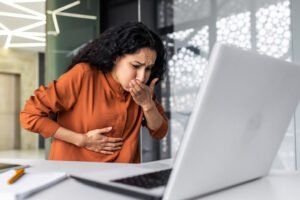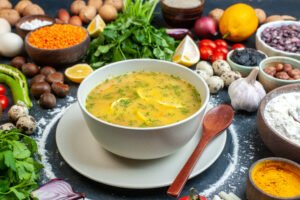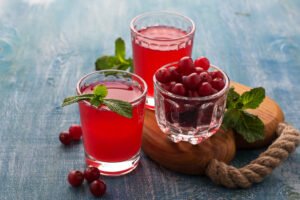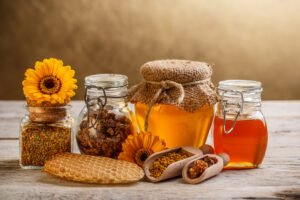
Inflammation of the stomach lining (Gastritis), can be a painful and discomforting condition, particularly at night when symptoms may exacerbate.
While there are various remedies and supplements available to alleviate gastritis symptoms, not all of them are suitable for consumption before bedtime.
Understanding what aids gastritis relief at night and which supplements to avoid can significantly improve one’s management of this condition.
Let’s delve into the essential aspects of managing gastritis, focusing on supplements and their appropriateness for nighttime use.
What Helps Gastritis at Night?
Managing gastritis at night involves adopting habits and consuming substances that soothe the stomach lining and promote better digestion.
Here are some strategies that can aid in gastritis relief:
- Proper Diet
Consuming a bland diet that includes easily digestible foods like rice, bananas, and boiled potatoes can help alleviate gastritis symptoms at night. Avoiding spicy, acidic, or fried foods is essential to prevent aggravating the stomach lining.
- Small, Frequent Meals
Opting for smaller, more frequent meals rather than large, heavy ones can ease the burden on the stomach and reduce the likelihood of experiencing discomfort at night.
- Elevating the Head During Sleep
Using extra pillows to elevate the head while sleeping can help prevent acid reflux, a common symptom of gastritis, from worsening at night.

What Not to Take If You Have Gastritis?
Certain foods and medications can exacerbate gastritis symptoms when taken at night, potentially leading to increased discomfort and disrupted sleep.
Here are some things to avoid:
- Non-Steroidal Anti-Inflammatory Drugs (NSAIDs)
NSAIDs like aspirin, ibuprofen, and naproxen can irritate the stomach lining and worsen gastritis symptoms, especially when taken before bedtime.
- Alcohol
Alcohol can irritate the stomach lining and increase acid production, making it detrimental for individuals with gastritis, particularly when consumed close to bedtime.
- Caffeine
Stimulants like caffeine can relax the lower esophageal sphincter, allowing stomach acid to flow back into the esophagus and exacerbating symptoms of gastritis, such as heartburn, at night.
- Acidic Foods
Foods high in acidity, such as citrus fruits and tomatoes, can irritate the stomach lining and worsen gastritis symptoms, especially when consumed close to bedtime.
- Carbonated Drinks
Carbonated beverages can increase gas production and contribute to bloating and discomfort, making them unsuitable for individuals with gastritis, particularly at night.
Why is Gastritis Worse at Night?
Several factors contribute to the worsening of gastritis symptoms at night:
- Decreased Gastric Mucosal Defense
The stomach’s ability to protect itself from the effects of gastric acid decreases at night, making the stomach lining more vulnerable to irritation and inflammation.
- Supine Position
Lying down horizontally can facilitate the backflow of stomach acid into the esophagus, leading to symptoms like heartburn and regurgitation, which are commonly associated with gastritis.
- Delayed Gastric Emptying
In some individuals, gastric emptying may slow down during nighttime, prolonging the exposure of the stomach lining to gastric acid and potentially exacerbating gastritis symptoms.
What Makes Gastritis Worse?
Several lifestyle factors and dietary choices can worsen gastritis symptoms:
- Smoking: Smoking can increase stomach acid production and impair the stomach’s ability to protect itself from irritation, leading to worsening symptoms of gastritis.
- Stress: Chronic stress can exacerbate gastritis symptoms by increasing stomach acid production and disrupting the balance of protective factors in the stomach lining.
- Spicy and Fried Foods: Foods high in spices or fried in oil can irritate the stomach lining and worsen gastritis symptoms, especially when consumed close to bedtime.
- Overeating: Consuming large meals can put excessive pressure on the stomach and increase the likelihood of experiencing discomfort and reflux at night.
- Late-night Eating: Eating close to bedtime can delay gastric emptying and increase the risk of acid reflux, exacerbating gastritis symptoms.

What Supplements Are Good for Gastritis?
While some supplements may exacerbate gastritis symptoms at night, others can provide relief and support digestive health. Here are some supplements that are beneficial for individuals with gastritis:
- Probiotics
Probiotic supplements containing beneficial bacteria can help restore the balance of gut microflora and promote digestive health, potentially reducing symptoms of gastritis.
- Deglycyrrhizinated Licorice (DGL)
DGL supplements can help soothe the stomach lining and alleviate symptoms of gastritis, such as heartburn and indigestion.
- Zinc Carnosine
Zinc carnosine supplements have been shown to support the integrity of the stomach lining and promote healing in individuals with gastritis.
- Peppermint Oil
Peppermint oil supplements can help relax the muscles of the gastrointestinal tract and alleviate symptoms of indigestion and discomfort associated with gastritis.
- Ginger
Ginger supplements have anti-inflammatory and soothing properties that may help reduce inflammation in the stomach lining and alleviate symptoms of gastritis.
Does Omega 3 Help Gastritis?
Omega-3 fatty acids, found in fish oil supplements, have anti-inflammatory properties that may benefit individuals with gastritis by reducing inflammation in the stomach lining.
However, it is advisable to avoid taking omega-3 supplements at night, as they can cause gastrointestinal discomfort in some individuals.
Supplements You Should Not Take At Night For Gastritis
In addition to NSAIDs, alcohol, caffeine, and acidic foods, other supplements to avoid at night for gastritis relief include:
- Iron Supplements: Iron supplements can irritate the stomach lining and cause gastrointestinal discomfort, particularly when taken on an empty stomach or close to bedtime.
- Vitamin C: High doses of vitamin C supplements can increase stomach acid production and exacerbate gastritis symptoms, especially when taken before bedtime.
- Turmeric: While turmeric supplements have anti-inflammatory properties, they can also stimulate gastric acid secretion and worsen gastritis symptoms if taken at night.
- Glucosamine: Glucosamine supplements may cause gastrointestinal side effects such as nausea and upset stomach, particularly when taken at night.
- High-Fiber Supplements: High-fiber supplements can increase bulk in the stool and may exacerbate symptoms of bloating and discomfort in individuals with gastritis, especially at night.
What Naturally Kills H. pylori?
H. pylori is a bacterium associated with the development of gastritis and peptic ulcers. Natural substances that may help eradicate H. pylori include:
- Manuka Honey: Manuka honey has antibacterial properties that may help inhibit the growth of H. pylori and promote healing in individuals with gastritis.
- Garlic: Garlic contains compounds with antimicrobial properties that may help kill H. pylori and reduce inflammation in the stomach lining.
- Cranberry Juice: Cranberry juice contains compounds that may help prevent H. pylori from adhering to the stomach lining, thereby reducing the risk of gastritis and ulcers.
How Gastritis Supplements Can Help and Form to Take
Gastritis supplements can help alleviate symptoms and promote healing by addressing underlying factors such as inflammation and bacterial overgrowth.
When choosing supplements for gastritis relief, it is essential to opt for high-quality products and follow recommended dosages.
Liquid forms of supplements may be more easily absorbed and tolerated by individuals with gastritis, particularly when taken before meals.
In conclusion
Managing gastritis at night involves adopting lifestyle habits and dietary choices that promote digestive health and avoiding supplements that may exacerbate symptoms.
By understanding what helps and what to avoid, individuals with gastritis can effectively manage their condition and improve their quality of life.
Always consult with a healthcare professional before starting any new supplements or making significant changes to your diet or lifestyle, especially if you have a pre-existing medical condition.












